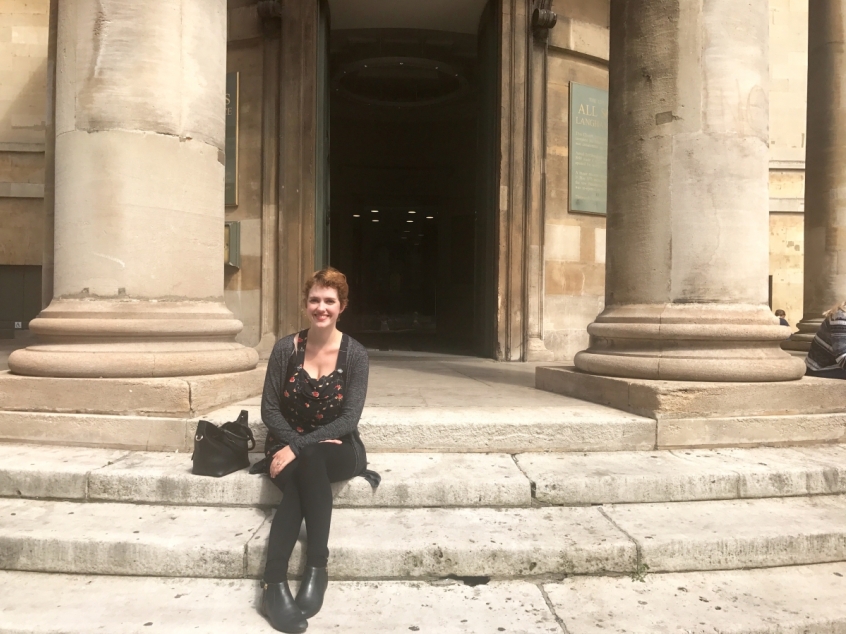
The battles that prominent Christians have over what they do and do not believe are often played out in public. What to believe, how to believe and why are questions that challenge all Christians, and we all know what the current topics of contention are.
In her new book, the Archbishop of Canterbury's daughter Katharine Welby Roberts has written all about faith, but she does not address the contentious topics of the day. Her battle to believe is quite straightforward. The Bible tells us of God's infinite love, mercy and forgiveness. And it is this that Katharine struggles to believe in. She has a theology degree, but she's happy to leave the other stuff to the theologians.
Her book, I Thought There Would Be Cake, spells out with searing honesty the roots of her low self-esteem. It is not so much that she struggles to believe in God. She struggles to believe in a God that would believe in her. Once a prolific blogger, where she chronicled with moving honesty her battles with depression and chronic fatigue, she is now taking a lower online profile and has written this book instead – as well as finding time to be mum to Elijah, now 10 months old.
'It is other people – those who have the opportunity to point and laugh – that make failure so scary,' she confesses in her book. 'I used to write blogs regularly, but not so much now, largely because I am afraid of what people will say.'
She did once write a theological post. Someone commented, 'You should probably do a theology degree before you try to get into this!' This betrayed that commenter's ignorance, as she does have one.
'But that showed me that I shouldn't try to go beyond talking about myself. Putting yourself in a position where you can be told you are wrong, or you can fail at something you want to succeed at, leaves you vulnerable to unkind comments,' she writes.
'The Bible teaches us much about God's infinite love for us, but this rarely translates, for me, into actually believing it to be true. Society teaches us a more believable narrative – that we always need to be better than we are to be truly acceptable.'
The issue manifests in such questions as asking her husband Mike almost daily if he is going to leave her. 'He says "no". Now he just thinks it's funny. I think I know he isn't, but I just need that reassurance regularly.'
It is possible that some of the roots of her low self-esteem lie in how she was treated at school by a group of friends who suddenly, without explanation, excluded her.
Today this is known as 'ghosting' but then there was no word for it.
'Ghosting someone is horrific, it is the cruellest thing anyone can do,' she says in an interview with Christian Today. 'Anyone who can be so cold as to cut someone out without a word of explanation has some seriojus issues they need to resolve.'
But she did get through it. To those suffering this today, one way through is to talk to people – something she didn't do. 'I don't think I really registered what had happened or talked to people about it. I certainly do live with a lifelong constant fear of people thinking I'm not worth their time. Thinking back – the feeling of complete despair when you realise people have decided you are not worthy of explanation – it's so cruel. I hate that it's become a "thing" people do. Its taken the lack of communithy to a whole new level.'
Though she actually believes her own low self-esteem is down to character rather than simply episodes such as this. 'I have friends who have had a similar life to me and don't have it on the same level.'
Now 31, she has spent a large part of her young adult life alongside the emergence of social media. 'It's a very positive thing but has potential to have negative effects as anything is when used badly. But it can add a lot of pressure to perform and put life on show – to look really good and together. If it doesn't, it feels as if you're obviously failing at life. We are more exposed as a generation in that there wasn't this facility before for people to share so much of their life so widely.'
So given her fear and esteem issues, why write it all down in a book? 'Oh, because I'm completely reckless and maybe foolish! I just thought it was a good idea at the time. I'ld like to hope I could help people. It's funny, I've basically written a book all about me and thinking it could help other people.'
She knows about herself and how she feels. 'I can't tell people how to make their lives better but I can tell them how I'm surviving in mine. I would really like to help people who struggle to find hope.'
The book is not an instruction, it's an invitation. She understands how much it can help people to talk about themselves, and to read of others suffering similar issues. With depression and issues of esteem so prevalent among younger generations, there are many who will find the book helpful.
So given her astute pastoral instincts, has she ever felt a call to ordination herself?
'I thought about it and discarded it. God would have to appear literally before me and say, "Become a vicar". Even then, I would say, "Are you sure you are God?" I don't want to be a vicar. I've seen it from the other side. It just looks like an awful lot of hard work. I can see why people are called to it. Also I don't want more people comparing me to my father. One in four people every year suffers from a mental health problem. With vicars it's 50 per cent. I think it's a very worthy profession. But I don't think I could live up to it.'
One thing that has helped her in her struggles with depression is her faith. 'I've experienced God and seen his work in my life and seen him do extraordinary things with other people, through other people,' she says. 'I love being in the country, being somewhere high up. Creation is always the thing that makes me marvel at God, makes me recognise that God is so much bigger than anything I could comprehend.
'Going through pregnancy – those early weeks where you think my baby is a poppy seed, my baby is a pumpkin seed, the brainstem has just formed – it's so extraordinarily clever, what happens. Then seeing Elijah's fascination with the world, though the eyes of someone who's never seen it before, someone who's not known pain. You suddenly realise that the world is so much more extraordinary than you thought on a day-to-day basis, and that God created that. That's where I see Jesus most, his love and care for the world, for us all.'
I Thought There Would Be Cake is published by SPCK













